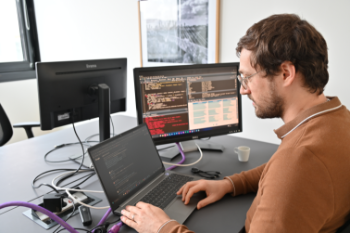
Phd Position F - m on Deep Learning Methods For Mapping Species Interactions H/F INRIA
Montpellier - 34 CDD- 🏠 Télétravail partiel
- 🕑 36 mois
- Bac +5
- Service public des collectivités territoriales
Les missions du poste
PhD Position F/M on deep learning methods for mapping species interactions
Le descriptif de l'offre ci-dessous est en Anglais
Type de contrat : CDD
Niveau de diplôme exigé : Bac +5 ou équivalent
Fonction : Doctorant
Niveau d'expérience souhaité : Jeune diplômé
Contexte et atouts du poste
This PhD thesis (with the possibility of starting with an internship/MSc thesis) is part of the PEPR Agroécologie & Numérique project (), which is being developed by nine French institutions. EcoControl aims to improve our understanding of arthropod regulatory services and identify agroecological levers to enhance natural pest regulation in agriculture at both local and territorial levels, in continental France, Corsica and Guadeloupe. To achieve this goal, we will combine fieldwork with innovative conceptual and numerical approaches. We will address the following classical though not yet answered question : How do biotic and abiotic factors, whether phylogenetic, environmental, related to farming practices or to the introduction of alien species, influence the structure and dynamics of interaction networks between plants (cultivated or not), pests indigenous or introduced), and their natural enemies (predators /parasitoids)?
In this context where we need to jointly predict many species share responses to the environment, since they share a common niche, and have dependencies through biotic interactions, multi-species species distribution models (SMDs) can BE relevant. In this project we will build upon recent work on deep learning-based SDMs (Ryckewaert et al., 2024), as they have they can automatically learn joint environmental features that predict well all the species.
Mission confiée
The objective of this thesis is to develop and deploy the necessary methods to map, at a scale ranging from region to country, the likelihood of ecological interactions relevant to the spread and regulation of agricultural pests.
This will require :
1) creating a large-scale dataset of environmental variables (e.g. OSO, Corine Land Cover, SAFRAN, Worldclim), as well as variables stemming from remote sensing (e.g. Landsat, Sentinel), that can BE related to species responses (e.g. Picek et al., 2024);
2) training SDMs for the species of interest based these variables and species observations and/or surveys (starting from the work of Ryckewaert et al., 2024). To make the most out of the opportunistic and standardized data available, we aim at extending Integrated SDM principles (Isaac et al., 2020) to deep learning SDMs;
3) use information about ecological networks (from other partners in the EcoControl consortium) in order to understand which locations are compatible with several ecological interactions of interest, mostly related to plant pests;
4) a reflection based on explainable AItools will BE considered in order to help ecological modelers better understand complex model behavior at different scales. Special attention will also BE paid to ensuring the developed methods allow for a probabilistic interpretation of the predictions to make them more useful for downstream tasks within the consortium.
Picek et al. "GeoPlant : Spatial Plant Species Prediction Dataset." NeurIPS Datasets and Benchmarks Track. (2024)
Ryckewaert et al. "Applying the maximum entropy principle to multi-species neural networks improves species distribution models." arXiv preprint arXiv :2412.19217 (2024).
Isaac, N. J., Jarzyna, M. A., Keil, P., Dambly, L. I., Boersch-Supan, P. H., Browning, E... & O'Hara, R. B. Data integration for large-scale models of species distributions. Trends in ecology & evolution, 35(1), 56-67.(2020)
Principales activités
The selected PhD candidate is expected to :
- Become familiar with the state-of-the-art on species distribution modelling.
- Construct a dataset with the necessary input variables and reference data, including opportunistic species observations and systematic biodiversity surveys.
- Develop the necessary multi-modal deep learning methods to profit from the different modalities of input and reference data.
- Write papers describing this work aiming at top computer science and ecology venues.
Compétences
We are seeking a candidate that is strongly motivated to improve our understanding of the interaction between biodiversity and agriculture.
Top candidates would also have a strong command of :
- Python programming
- Deep learning frameworks (preferably Pytorch)
- Use of Linux GPU severs via command line
- Written scientific English
IT would BE a plus to have familiarity with :
- GIS and remote sensing
- Point process models and/or SDMs
Avantages
- Subsidized meals
- Partial reimbursement of public transport costs
- Leave : 7 weeks of annual leave + 10 extra days off due to RTT (statutory reduction in working hours) + possibility of exceptional leave (sick children, moving home, etc.)
- Possibility of teleworking (after 6 months of employment) and flexible organization of working hours
- Professional equipment available (videoconferencing, loan of computer equipment, etc.)
- Social, cultural and sports events and activities
- Access to vocational training
- Social security coverage
Rémunération
Duration : 36 months
Location : Sophia Antipolis, France
Gross Salary :
1st year : 2200 € per month
2nd and 3rd year : 2300 €per month
Bienvenue chez INRIA
A propos d'Inria
Inria est l'institut national de recherche dédié aux sciences et technologies du numérique. Il emploie 2600 personnes. Ses 215 équipes-projets agiles, en général communes avec des partenaires académiques, impliquent plus de 3900 scientifiques pour relever les défis du numérique, souvent à l'interface d'autres disciplines. L'institut fait appel à de nombreux talents dans plus d'une quarantaine de métiers différents. 900 personnels d'appui à la recherche et à l'innovation contribuent à faire émerger et grandir des projets scientifiques ou entrepreneuriaux qui impactent le monde. Inria travaille avec de nombreuses entreprises et a accompagné la création de plus de 200 start-up. L'institut s'eorce ainsi de répondre aux enjeux de la transformation numérique de la science, de la société et de l'économie.
Hellowork a estimé le salaire pour ce métier à Montpellier
Le recruteur n'a pas communiqué le salaire de cette offre mais Hellowork vous propose une estimation (fourchette variable selon l'expérience).
Estimation basée sur les données INSEE et les offres d’emploi similaires.
Estimation basse
33 900 € / an 2 825 € / mois 18,63 € / heureSalaire brut estimé
44 000 € / an 3 667 € / mois 24,18 € / heureEstimation haute
51 200 € / an 4 267 € / mois 28,13 € / heureCette information vous semble-t-elle utile ?
Merci pour votre retour !
- Montpellier - 34
- CDD
Créez une alerte
Pour être informé rapidement des nouvelles offres, merci de préciser les critères :
Finalisez votre candidature
sur le site du recruteur
Créez votre compte pour postuler
sur le site du recruteur !
sur le site du recruteur
sur le site du recruteur !
Ces offres pourraient aussi
vous intéresser


Recherches similaires
- Job Data scientist
- Job Informatique
- Job Béziers
- Job Sète
- Job Agde
- Job Lunel
- Job Pézenas
- Job La Grande-Motte
- Job Frontignan
- Job Ganges
- Job Mèze
- Job Bédarieux
- Job Développeur
- Job Technicien support informatique
- Job DevOps
- Job Développeur Java
- Job Chef de projet informatique
- Entreprises Informatique
- Entreprises Data scientist
- Entreprises Montpellier
- Job Fonction publique
- Job Collectivités
- Job Fonction publique territoriale
- Job Data
- Job Public
- Job Fonction publique Montpellier
- Job Collectivités Montpellier
- Job Fonction publique territoriale Montpellier
- Job Accompagne Montpellier
- Job Cdd Montpellier
- INRIA Montpellier
- INRIA Data scientist
{{title}}
{{message}}
{{linkLabel}}
